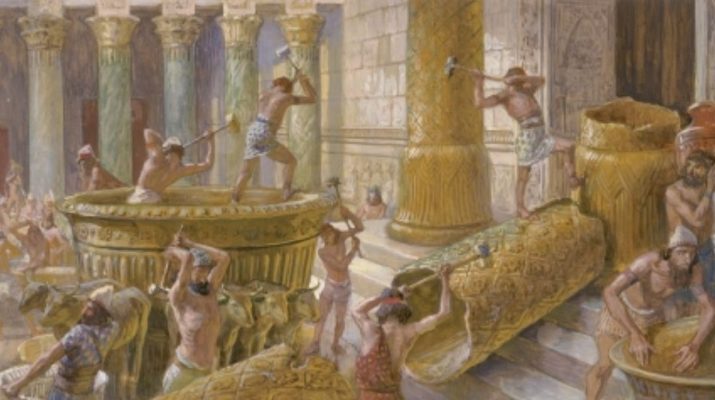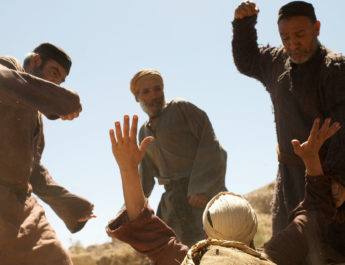Psalm 79
A PsalmI of Asaph.II
1 O God,III the nationsIV have comeV into your inheritance;VI
I “Psalm” = mizmor. From zamar (making music; used specially of music to worship God; music with singing, singing praise, singing psalms); may be from zamar (to trim or prune). This is a melody or a psalm.
II “Asaph” = Asaph. From asaph (to gather, assemble, bring, take away, destroy, or remove). This is Asaph, meaning “gatherer” or “collector.” It is a personal name.
III “God” = Elohim.
IV “nations” = goy. From the same root as gevah (the back, person, or body); related to gev (among); related to gaah (to rise up). This is nation or people. Often used to refer to Gentiles or foreign nations. It can also be used figuratively for a group of animals. This is where the Yiddish “goy” comes from.
V “come” = bo. This is to enter, come in, advance, fulfill, bring offerings, enter to worship, attack. It can also have a sexual connotation.
VI “inheritance” = nachalah. Related to nachal (to inherit, occupy, distribute, take as heritage). This is properly something that was inherited. It can mean occupancy generally or, more particularly, an heirloom or an estate. This can be an inheritance, gift, possession, or portion.
they have defiledVII your holyVIII temple;IX
they have laidX JerusalemXI in ruins.XII
VII “defiled” = tame. This is to defile, be unclean, pollute in a ritual or ethical sense.
VIII “holy” = qodesh. This is set apart and so sacred. God is different from us and so God is holy/set apart. Things we dedicate to God’s service are set apart for God and so they, too, are holy, etc.
IX “temple” = hekal. Perhaps from yakol (to be able, endure, overcome, prevail). This is a large building with public access such as a palace or temple.
X “laid” = sum. This is to put or place in a literal or figurative sense. It can be appoint, care, change, make, and may other things.
XI “Jerusalem” = Yerushalaim. From yarah (to throw, shoot, be stunned; to flow as water so figuratively to instruct or teach) + shalam (to make amends, to be complete or sound). This is Jerusalem, dwelling of peace.
XII “ruins” = i. 4x in OT. From avah (to bend, twist, be amiss). This is a ruin or a heap as a place that was overturned.
2 They have givenXIII the bodiesXIV of your servantsXV
XIII “given” = natan. This is to give, put, set, offer. It is to give literally or figuratively.
XIV “bodies” = nebelah. From nabel (to fall away, faint, wither, languish, sink; figuratively, being senseless, foolish, or wicked; to despise, disgrace, or fall to nothing, to be seen with contempt). This is a body, whether human or animal. It can also refer to an idol.
XV “servants” = ebed. From abad (to work, serve, compel; any kind of work; used causatively, can mean to enslave or keep in bondage). This is a servant, slave, or bondservant.
to the birdsXVI of the airXVII for food,XVIII
XVI “birds” = oph. From uph (to fly, flee, shine, be weary, be faint). This is a flying creature.
XVII “air” = shamayim. Root may mean being lofty. This is sky, the air, or heaven. It is in a dual noun form so this might refer to the part of the sky where the clouds move on the one hand and the part beyond that where the sun, moon, and stars are on the other hand.
XVIII “food” = maakal. From akal (to eat, devour, burn up, or otherwise consume; eating in a literal or figurative sense). This is food, something edible.
the fleshXIX of your faithfulXX to the wild animalsXXI of the earth.XXII
XIX “flesh” = basar. From basar (being a messenger, publish, carry preach; properly, this is being fresh, rosy or cheerful as one bearing news). This is flesh, the body, fat, skin, self, nakedness, humankind, or kin. It can also refer to private parts.
XX “faithful” = chasid. From chasad (being good, kind, merciful; may mean bowing one’s neck as is done in the presence of an equal for courtesy’s sake; so, if one in a superior position is treating you like an equal, that is what is captured here). This is faithful, kind, pious, merciful, or gracious. It can also refer to godly or pious people. This is where Chasidic Jews take their name from.
XXI “wild animals” = chay. From chayah (to live or keep alive literally or figuratively). This is alive, living, lifetime. It can also be used to describe someone’s age. It can refer to animals, plants, water, or a company or congregation of people. It is life in a very broad sense.
XXII “earth” = erets. Root may mean to be firm. This is earth, ground, field land, or country.
3 They have poured outXXIII their bloodXXIV like waterXXV
all aroundXXVI Jerusalem,
and there was no one to buryXXVII them.
XXIII “poured out” = shaphak. This is to pour out, gust, or slip. It can be to pour as blood, a drink offering, or molten metal. It can also mean to create a mound. Figuratively, it can refer to killing, or spending money.
XXIV “blood” = dam. Perhaps from damam (to cease, be or become mute, silent, still, cut off, hold peace, be astonished, die). This is blood, bloodshed, bloodguilt, lifeblood, and death. It is used for people and animals. More often blood from a wound or the blood of the innocent. Used figuratively for violence or for wine. Closely tied to life and death.
XXV “water” = mayim. This is water, waters, or waterway in a general sense. Figuratively, it can also mean juice, urine, or semen.
XXVI “all around” = sabib. From sabab (turning around, going around; to surround, cast, walk, fetch; to revolve or border in a literal or figurative sense). This is a circuit or a circle. It could refer to an environment, one’s neighbors, or a circular path round about.
XXVII “bury” = qabar. This is to bury or inter. It could also refer to the person who does the burying.
4 We have becomeXXVIII a tauntXXIX to our neighbors,XXX
mockedXXXI and deridedXXXII by those around us.
XXVIII “become” = hayah. This is to be or become, to happen.
XXIX “taunt” = cherpah. From charaph (to expose and so figuratively to reproach, defame, carp at, defy). This is reproach, rebuke, shame, or disgrace. It can also refer to genitals.
XXX “neighbors” = shaken. From shakan (to settle down in the sense of residing somewhere or staying there permanently; to abide or continue). This is resident or neighbor. It is related to mishkan, the Hebrew word for “tabernacle.”
XXXI “mocked” = laag. 6x in OT. From laag (to mock, deride, or laugh; to stammer or speak incomprehensibly as though imitating a foreigner; to scorn or mock). This is mocking, scoffing, derision.
XXXII “derided” = qeles. 3x in OT. From qalas (to mock, scorn, ridicule). This is derision or a laughingstock.
5 How long, O Lord?XXXIII Will you be angryXXXIV forever?XXXV
Will your jealous wrathXXXVI burnXXXVII like fire?XXXVIII
XXXIII “Lord” = YHVH. Related to “become” in v4. From havah (to be, become) or hayah (see note XXVIII above). This is the name of the God of Israel, the self-existent and eternal one, the tetragrammaton. This pronunciation has been lost to time so “Lord” is generally used in its place.
XXXIV “be angry” = anaph. 14x in OT. This is to breathe hard, i.e. to be angry or displeased.
XXXV “forever” = netsach. From natsach (something that glitters from a distance or stands out, excels, has status/standing; also to be permanent or enduring). This is properly a goal or destination as the bright focus to which one journeys. It can be splendor, truthfulness, or confidence. Most often, it refers to everlastingness, always, continually.
XXXVI “wrath” = qinah. Perhaps from qana (to be jealous, zealous, envious). This is zeal, jealousy, envy, anger, passion rivalry.
XXXVII “burn” = ba’ar. This is to burn, consume, heat, remove. It can also be to consume by a fire or through eating, being brutish or wasting.
XXXVIII “fire” = esh. This is fire, burning, flaming, hot. It is fire in a literal or figurative sense.
6 Pour out your angerXXXIX on the nations
that do not knowXL you,
and on the kingdomsXLI
that do not callXLII on your name.XLIII
XXXIX “anger” = chemah. From yacham (to be hot, mate; figuratively, to conceive). This is heat – figuratively it can be anger or fury. It can also refer to poison or venom as they can cause fever.
XL “know” = yada. This is to know, acknowledge, advise, answer, be aware, be acquainted with. Properly, this is to figure something out by seeing. It includes ideas of observation, recognition, and care about something. It can be used causatively for instruction, designation, and punishment.
XLI “kingdoms” = mamlakah. From the same as melek (king, royal). This is kingdom, dominion, sovereignty, rule. It can also refer to the realm.
XLII “call” = qara. This is to call or call out – to call someone by name. Also used more broadly for calling forth.
XLIII “name” = shem. Related to “laid” in v1. May be from sum (see note X above). This is name, fame, renown. A name was thought to indicate something essential about a person – something about their individuality. So, this word can also mean honor, authority, or character.
7 For they have devouredXLIV JacobXLV
and laid wasteXLVI his habitation.XLVII
XLIV “devoured” = akal. Related to “food” in v2. See note XVIII above.
XLV “Jacob” = Yaaqob. From the same as aqeb (heel, hind part, hoof, rear guard of an army, one who lies in wait, usurper). This is Isaac’s son and his descendants. The name means heel-catcher or supplanter.
XLVI “laid waste” = shamem. This is to stun or become numb. It can also mean to devastate or be appalled. Cnan also mean to be amazed or astonished.
XLVII “habitation” = naveh. From navah (home, beautify, praise) This is home, place where shepherd or sheep live. It is at home – implies a lovely place or a place of satisfaction. It can also be used for the Temple or a pasture as the home of wild animals.
8 Do not rememberXLVIII against us the iniquitiesXLIX of our ancestors;L
XLVIII “remember” = zakar. This is to remember, to mark something so that it can be recalled, to be mindful of, to mention.
XLIX “iniquities” = avon. Perhaps related to avah (to bend, twist, be amiss). This is sin, mischief, guilt, fault, punishment for iniquity, or moral evil.
L “ancestors” = rishon. From rishah (beginning or early time); from rosh (head, captain, or chief; excellent or the forefront; first in position or in statue or in time). This is first, former, ancestor, beginning, ranked first.
let your compassionLI come speedilyLII to meetLIII us,
for we are brought veryLIV low.LV
LI “compassion” = racham. From the same as rechem (womb); from racham (to love, have compassion, have mercy); from racham (compassion, tender love, womb, compassion; the womb as that which cherishes the fetus). This is compassion, mercy, or tender love.
LII “speedily” = maher. 18x in OT. From mahar (being liquid, which implies flowing; so, hurrying forward, whether in a positive or negative sense). This is speedy, quickly, soon, suddenly, or at once.
LIII “come…to meet” = qadam. From qedem (front, formerly, before, east, eternal, everlasting, antiquity). This is to come in front or be in front and so meet, anticipate, confront, receive, or rise. It sometimes means to meet for help.
LIV very” = meod. Perhaps from the same as uwd (firebrand, a poker). This is very, greatly, exceedingly. It can also mean vehemence, force, abundance.
LV “are brought…low” = dalal. 9x in OT. This is to be low, hang, fade, be emptied, become poor, be oppressed.
9 HelpLVI us, O God of our salvation,LVII
forLVIII the gloryLIX of your name;
LVI “help” = azar. This is to surround, which implies encircling to protect someone or help them out. It can also be help, ally, or support.
LVII “salvation” = yesha. From yasha (to deliver, defend, help, preserve, rescue, be safe. Properly, to be open, wide or free, which implies being safe. Used causatively, it means to free). This is salvation, deliverance, rescue, safety, welfare, liberty.
LVIII {untranslated} = dabar. From dabar (to speak, declare, discuss). This is speech, a word, a matter, an affair, charge, command, message, promise, purpose, report, request. It is a word, which implies things that are spoken of in a wide sense.
LIX “glory” = kabod. From kabad (to be heavy, weighty, burdensome). This is weighty. Figuratively, glorious, abundant, riches, honor, splendor – a reference to one’s reputation or character. This word is often used to describe God and God’s presence.
deliverLX us, and forgiveLXI our sins,LXII
for your name’s sake.
LX “deliver” = natsal. This is to snatch someone or something away in a good sense – as rescue, defend, or deliver – or in a bad sense – as strip or plunder.
LXI “forgive” = kaphar. This is to appease, cover, pacify, cancel, make atonement, placate. Specifically, it can mean to cover with bitumen.
LXII “sins” = chatta’ah. From chata’ (to miss or go wrong and so to sin, bear the blame; it can also include the sense of forfeiting or lacking). This is sin itself as well as punishment for sin. It is sometimes used specifically to refer to sin that is habitual.
10 Why should the nations say,
“Where is their God?”
Let the avengingLXIII of the outpouredLXIV blood of your servants
be known among the nations before our eyes.LXV
LXIII “avenging” = neqamah. From naqam (a quarrel or vengeance); from naqam (to avenge, punish, have a grudge, execute). This is vengeance, or revenge – whether the act of vengeance or the drive towards vengeance.
LXIV “outpoured” = shaphak. Same as “poured out” in v3. See note XXIII above.
LXV “eyes” = ayin. This is eye in a literal or figurative sense so eye, appearance, favor, or a fountain (the eye of the landscape).
11 Let the groansLXVI of the prisonersLXVII come beforeLXVIII you;
LXVI “groans” = anaqah. 4x in OT. From anaq (to cry or groan). This is crying, sighing, shrieking, or groaning.
LXVII “prisoners” = assir. 4x in OT. From asar (to tie, yoke, bind, or fasten; can mean to harness an animal, to join in fighting a battle, or to imprison someone). This is prisoner or captive.
LXVIII “before” = paneh. From panah (to turn, face, appear). This is face in a literal or figurative sense. It could be face, presence, anger, respect. It can also be used of God to indicate divine favor or presence.
according to your greatLXIX powerLXX preserveLXXI those doomed to die.LXXII
LXIX “great” = godel. 13x in OT. From gadal (to grow, grow up, be great, magnify, exalt). This greatness, arrogance, or magnitude. It can be used in a literal or a figurative sense.
LXX “power” = zeroa. Perhaps from zara (to sow, scatter seed, conceive). This is the arm, shoulder, or foreleg of an animal. It is figuratively used for power, force, might, or help.
LXXI “preserve” = yathar. This is to jut over, remain behind, preserve, to excel. It can be to leave or to be in abundance.
LXXII “those doomed to die” = ben + timuthah. Literally, “children of death.” Ben is from banah (to build or obtain children). This is son, age, child. It is son in a literal or figurative sense. Timuthah is 2x in OT. From mut (to die in a literal or figurative sense). This is death or doom.
12 ReturnLXXIII sevenfoldLXXIV into the bosomLXXV of our neighbors
the taunts with which they tauntedLXXVI you, O Lord!LXXVII
LXXIII “return” = shub. To turn back, return, turn away – literally or figuratively. Doesn’t necessarily imply going back to where you started from. This is also the root verb for the Hebrew word for repentance “teshubah.”
LXXIV “sevenfold” = shibathayim. 6x in OT. From sheba (seven – the number of perfection/sacred fullness). This is seven times.
LXXV “bosom” = cheq. Root may mean to enclose. This is bosom in a literal or figurative sense. So, this could be arms, lap, or midst. It can also be care or cherish.
LXXVI “taunted” = charaph. Related to “taunt” in v4. See note XXIX above.
LXXVII “Lord” = Adonai. From adon (lord, master, owner); root means to rule or be sovereign. This is the actual Hebrew word for Lord used (in a different form) of humans and (in the present form) of God. It means someone who is in control.
13 Then we your people,LXXVIII the flockLXXIX of your pasture,LXXX
LXXVIII “people” = am. From amam (to darken, hide, associate; creating shadows by huddling together). This is people or nation. It can be used specifically for a tribe, collectively of troops or armies, or figuratively to refer to a flock of animals.
LXXIX “flock” = tson. This is a flock of sheep and goats.
LXXX “pasture” = marith. 10x in OT. From raah (to graze, tend a flock, keep company with; to pasture in a literal or figurative sense). This is shepherding, pasturage, a flock.
will give thanksLXXXI to you forever;LXXXII
from generationLXXXIII to generation we will recountLXXXIV your praise.LXXXV
LXXXI “give thanks” = yadah. From yad (hand). This is to throw one’s hands into the air in a gesture of praise. So, it is to praise, give thanks, or make a confession.
LXXXII “forever” = olam. This is a long scope of time whether in the past (antiquity, ancient time) or in the future (eternal, everlasting).
LXXXIII “generation” = dor. From dur (to move in a circle, which implies living somewhere or remaining there; it can also be the sense of piling or heaping up). This is a revolution of time, which is to say, an age or generation. It can also be a dwelling or one’s posterity.
LXXXIV “recount” = saphar. From sepher (writing, document, book, evidence). This is properly to tally or record something. It can be enumerate, recount, number, celebrate, or declare.
LXXXV “praise” = tehillah. From halal (to praise, be boastful). This is praise or a song of praise. It is to offer God a hymn, to boast in God. This shares a root with “hallelujah.”
Image credit: “The Chaldees Destroy the Brazen Sea” by James Tissot, between circa 1896 and circa 1902.




